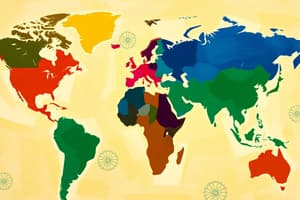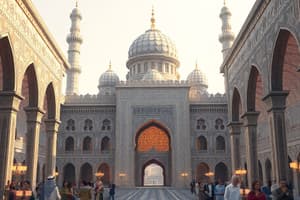Podcast
Questions and Answers
What is a key characteristic of interest groups?
What is a key characteristic of interest groups?
- They aim to promote individual political candidates.
- They focus exclusively on violent protests.
- They operate independently from social movements.
- They are formally organized to influence public policy. (correct)
What type of tactics might pressure groups use to achieve their aims?
What type of tactics might pressure groups use to achieve their aims?
- Engaging in legal battles exclusively.
- Censorship of opposing views.
- Public marches, protests, and social media campaigns. (correct)
- Direct influence through lobbying in secrecy.
Which media source is described as left-leaning in the UK?
Which media source is described as left-leaning in the UK?
- The Guardian (correct)
- The Daily Mail
- CNN
- Fox News
Why is it important to consider the bias of media sources in global politics?
Why is it important to consider the bias of media sources in global politics?
Which of the following best describes the relationship between pressure groups and interest groups?
Which of the following best describes the relationship between pressure groups and interest groups?
What criteria must a political entity meet to be considered a state?
What criteria must a political entity meet to be considered a state?
Which of the following is a characteristic of intergovernmental organizations (IGOs)?
Which of the following is a characteristic of intergovernmental organizations (IGOs)?
What is an example of an IGO focused on political integration?
What is an example of an IGO focused on political integration?
In terms of political systems, why is it misleading to assume that all states look the same?
In terms of political systems, why is it misleading to assume that all states look the same?
What does civil society encompass according to the content provided?
What does civil society encompass according to the content provided?
What is the primary function of NATO as an intergovernmental organization?
What is the primary function of NATO as an intergovernmental organization?
What is a common misconception about political systems around the world?
What is a common misconception about political systems around the world?
What distinguishes subnational governments from national governments?
What distinguishes subnational governments from national governments?
What primarily distinguishes resistance movements from social movements?
What primarily distinguishes resistance movements from social movements?
Which of the following best describes the role of NGOs?
Which of the following best describes the role of NGOs?
What characterizes Transnational Corporations (TNCs) and Multinational Companies (MNCs) in the context of global politics?
What characterizes Transnational Corporations (TNCs) and Multinational Companies (MNCs) in the context of global politics?
Which statement about social movements is not accurate?
Which statement about social movements is not accurate?
How are resistance movements perceived by those in power?
How are resistance movements perceived by those in power?
Which of the following is a defining feature of private actors?
Which of the following is a defining feature of private actors?
What is a characteristic of some resistance movements, such as the Hong Kong pro-democracy movement?
What is a characteristic of some resistance movements, such as the Hong Kong pro-democracy movement?
Why are resistance movements often considered risky in certain states?
Why are resistance movements often considered risky in certain states?
Flashcards are hidden until you start studying
Study Notes
States
- The modern conception of a state is rooted in the Peace of Westphalia (1648) and the Montevideo Convention (1933).
- States are defined by specific criteria.
- States have diverse political systems, often classified on a spectrum from left to right.
- State systems are complex and messy, making it difficult to categorize them neatly.
Subnational and Local Governments
- Most states have multiple levels of subnational and local government beyond the national level.
Intergovernmental Organisations (IGOs)
- IGOs are formal organizations comprised of two or more states cooperating on shared interests.
- The United Nations (UN) is a well-known IGO focused on a broad range of international issues.
- Other examples of IGOs include NATO (collective defense) and the European Union (EU) (political integration).
Organised Civil Society, including NGOs
- Civil society encompasses institutions or groups independent of both the state and the market.
- Examples of civil society organizations include professional associations, trade unions, churches, and charities.
- Non-governmental organizations (NGOs) are independent of government and aim to influence policy or achieve objectives through lobbying and direct action.
- NGOs like Amnesty International and the International Rescue Committee operate at various scales and for diverse purposes.
Private Actors and Companies
- Private actors are individuals or organizations not directly involved in government but capable of influencing change.
- Private companies, particularly multinational corporations (MNCs) and transnational corporations (TNCs), can significantly impact political decision-making processes due to their global operations.
Social Movements
- Social movements are groups of individuals united by concerns about how society functions.
- Social movements can be categorized by the type and extent of change sought.
- The progression of social movements can be analyzed using models like David Aberle's.
Resistance Movements
- Resistance movements are similar to social movements but prioritize resisting and rejecting specific policies, laws, or leaders.
- Resistance movements often pose a challenge to those in power, making participation risky, especially in states with limited political freedom.
- Resistance movements can employ tactics ranging from nonviolent protests to armed conflict.
Interest and Pressure Groups
- Interest groups are formally organized groups advocating for public policy changes related to their specific interests.
- Examples include groups representing industries (e.g., tobacco), issue-based groups (e.g., abortion), and religious organizations.
- Pressure groups operate within broader interest groups, aiming for direct influence on those wielding power through tactics like marches, protests, and social media campaigns.
The Media
- The media, including traditional print and television, and social media, plays a significant role in shaping global political discourse.
- Various media outlets may claim neutrality, but most have biases, impacting information consumption and influencing public perception.
- It's crucial to critically evaluate media sources for reliability and trustworthiness considering their potential biases.
Studying That Suits You
Use AI to generate personalized quizzes and flashcards to suit your learning preferences.




